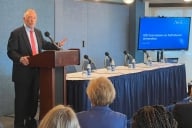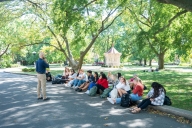You have /5 articles left.
Sign up for a free account or log in.
There can be few less likely locations for a new Baptist college than a former hotel and conference center in Bennington, Vt., in the southwest corner of one of the nation’s least religious states, where Baptists of any stripe make up a tiny fraction of the population.
Still, it’s in Bennington, on the third and fourth story of a former Ramada Inn and Conference Center, that Northeastern Baptist College is planning to open its doors next fall. It hopes to do so with 100 students, a clear pathway to regional accreditation, and $7 million in the bank.
Those goals would be ambitious for any new college. The difficulty is compounded by the obstacle of Vermont’s, and New England’s, religious culture: in rankings of states’ residents’ churchgoing habits or frequency of prayer or belief in God, Vermont always is near the end, if not dead last. In early 2011, the Gallup organization named it the least religious state in the country.
That, says Mark Ballard, the college’s president, is why Northeastern Baptist hopes to open there -- to enroll students like he once was himself, interested in studying the Bible at an accredited college without straying far from home.
For Ballard, home was southern Colorado, where he began preaching in Baptist churches at the age of 12: “I sensed a call of God to be a preacher when I was very young,” he said. Before he was old enough to drive himself to church, Ballard said, he was in the pulpit almost every Sunday, substituting for pastors who were traveling or sick, in churches across southern Colorado and northern New Mexico. By the time he graduated from high school, he said, small churches had invited him to be their pastor full-time, but he wanted to pursue a college education first.
But he couldn’t find a four-year college in southern Colorado that was both accredited and offering a bachelor’s degree in Biblical studies. “I knew I needed to get my education, so I ended up doing what most young guys in Colorado did: ‘O.K., I’ve got to go to Texas or Oklahoma,’” said Ballard, who earned his bachelor’s degree from Criswell College, a Baptist college in Dallas, and his master’s in divinity from Southeastern Baptist Theological Seminary, in Wake Forest, N.C.
He never returned to Colorado. “A seed was planted in my heart: that one day God would use me to start a college somewhere where it wasn’t readily available,” Ballard said. The seed lay dormant for the next decades, as he finished college and worked as a pastor throughout the South.
Ballard and his wife moved to New Hampshire in 1998 to start a church, and immediately felt at home in New England. “We just kind of settled in and the church began to grow,” Ballard said. In 2000, he started an unaccredited Bible institute, in part to train pastors in the region.
Then, in October 2009, he returned to his teenage dream of starting a full-fledged college. About eight months later, he began to assemble a team, raise money and search for a site -- a search that led him to the old Ramada Inn in Bennington, already home to a Christian elementary and secondary school.
When the college opens next fall, it will offer bachelor’s degrees in Biblical studies, education and music, Ballard said. Students, faculty and staff all must sign the Southern Baptist Convention’s faith statement -- which calls for “a proper balance between academic freedom and academic responsibility ... limited by the pre-eminence of Jesus Christ, by the authoritative nature of the Scriptures, and by the distinct purpose” of the college, and forbids adultery, homosexuality and pornography.
Statements of faith are common at Christian colleges (although more frequently enforced for faculty and staff than for students), but rare in Vermont. Only two members of the Council for Christian Colleges and Universities, an association of mostly evangelical, regionally accredited colleges who hire only Christians, are in New England. While Boston has one Baptist Bible college, it's rare to find Baptist colleges north of Washington.
Starting a college in the Northeast is harder than in the South, Ballard said; in Vermont, the state’s approval process is complicated, with a high level of scrutiny. It hopes to have degree-granting authority by the time classes begin next year, and accreditation from the New England Association of Schools and Colleges not long after. The college has already hired some faculty members, but cannot give their names, saying many are currently employed at other colleges.
“We want to get regional accreditation from the beginning,” Ballard said. “We want to do this, and we want to do it right.”
That’s in part for accreditation’s stamp of legitimacy, but also because it serves as the gateway to federal financial aid. The college estimates that the cost of educating each student will be somewhere between $30,000 and $35,000, including housing, but hopes to keep the price for students at no more than $14,000 per year.
About 33 students, many from the South, have already signed up for “preview classes” this year, which aren’t offered for credit. The college has just begun to ramp up recruitment, Ballard said, but is aiming for 100 students. Money -- not interest -- is the biggest challenge.
While several Baptist churches are contributing, and the college has an agreement with the Green Mountain Baptist Association, it is not owned -- and thus not funded -- by any Baptist convention or denomination. Donations have come from churches, businesses and individuals. “I always tell people we started with $47,” Ballard said. “God has certainly been faithful and provided and we’ve come a long way.”
Many churches are intrigued by the new college’s location. But Ballard says he heavily plays up New England’s Baptist roots. The Haystack Revival, which started the American missionary movement in the early 19th century, began at Williams College in Massachusetts, 15 miles south of Bennington. At churches in the South, he said, he always claims to bring greetings from the birthplace of the Baptist faith.
“When we go down there to tell what we’re doing and raise some financial support, they hear about the debt that’s owed to New England,” he said.








